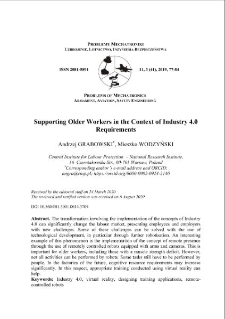Nasza Biblioteka Cyfrowa udostępnia 1 868 obiektów cyfrowych
Obiekt
Tytuł: Supporting Older Workers in the Context of Industry 4.0 Requirements ; Supporting Older Workers in the Context of Industry 4.0 Requirements
Tytuł odmienny:
Wspomaganie starszych pracowników w kontekście wymagań Przemysłu 4.0 ; Wspomaganie starszych pracowników w kontekście wymagań Przemysłu 4.0
Współtwórca:
Mieszko WODZYŃSKI ; Mieszko WODZYŃSKI
Abstrakt:
The transformation involving the implementation of the concepts of Industry 4.0 can significantly change the labour market, presenting employees and employers with new challenges. Some of these challenges can be solved with the use of technological development, in particular through further robotisation. An interesting example of this phenomenon is the implementation of the concept of remote presence through the use of remotely controlled robots equipped with arms and cameras. This is important for older workers, including those with a muscle strength deficit. However, not all activities can be performed by robots. Some tasks still have to be performed by people. In the factories of the future, cognitive resource requirements may increase significantly. In this respect, appropriate training conducted using virtual reality can help.
;
The transformation involving the implementation of the concepts of Industry 4.0 can significantly change the labour market, presenting employees and employers with new challenges. Some of these challenges can be solved with the use of technological development, in particular through further robotisation. An interesting example of this phenomenon is the implementation of the concept of remote presence through the use of remotely controlled robots equipped with arms and cameras. This is important for older workers, including those with a muscle strength deficit. However, not all activities can be performed by robots. Some tasks still have to be performed by people. In the factories of the future, cognitive resource requirements may increase significantly. In this respect, appropriate training conducted using virtual reality can help.
Miejsce wydania:
Warszawa
;
Warszawa
Wydawca:
Wojskowa Akademia Techniczna ; Wojskowa Akademia Techniczna
Data utworzenia:
Data złożenia:
Data akceptacji:
Data wydania:
Rozmiar:
Identyfikator:
oai:ribes-88.man.poznan.pl:2593
Sygnatura:
DOI 10.5604/01.3001.0014.3709 ; DOI 10.5604/01.3001.0014.3709
ISSN elektroniczny:
ISSN drukowany:
Język:
Właściciel praw:
Wojskowa Akademia Techniczna ; Wojskowa Akademia Techniczna
Strona początkowa:
Strona końcowa:
Tom:
Słowa kluczowe:
Industry 4.0, virtual reality, designing training applications, remote-controlled robots ; Industry 4.0, virtual reality, designing training applications, remote-controlled robots
Kolekcje, do których przypisany jest obiekt:
Data ostatniej modyfikacji:
1 paź 2025
Data dodania obiektu:
1 paź 2025
Liczba wyświetleń treści obiektu:
0
Wszystkie dostępne wersje tego obiektu:
https://ribes-88.man.poznan.pl/publication/2909
Wyświetl opis w formacie RDF:
Wyświetl opis w formacie OAI-PMH:
| Nazwa wydania | Data |
|---|---|
| Supporting Older Workers in the Context of Industry 4.0 Requirements | 1 paź 2025 |
Obiekty Podobne
Andrzej GRABOWSKI Mieszko WODZYŃSKI
Andrzej GRABOWSKI Mieszko WODZYŃSKI
Andrzej GRABOWSKI Paweł ZAWADZKI
Andrzej GRABOWSKI Mieszko WODZYŃSKI
Andrzej GRABOWSKI Zuzanna URBAŃSKA, Dariusz KALWASIŃSKI

